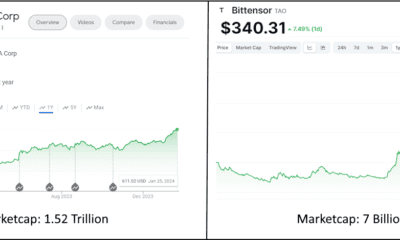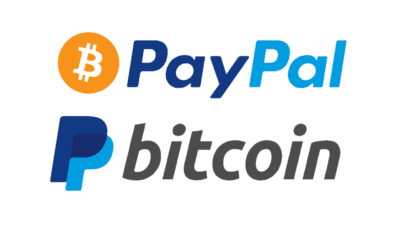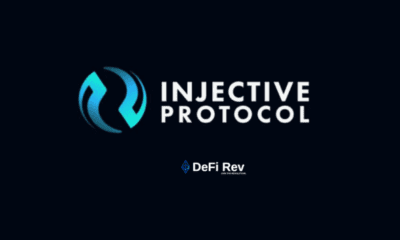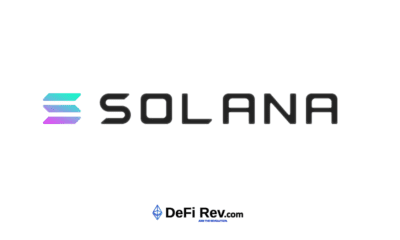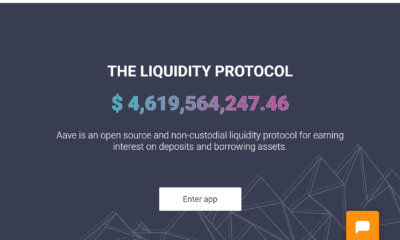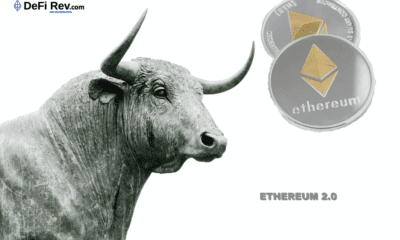news
Tornado Cash Roman Storm Found Guilty on Single Charge, Confident appeal to overturn verdict

Tornado Cash Roman Storm, who co-founded the company, was found guilty on one charge but avoided convictions on the two most serious allegations after a Manhattan federal jury failed to reach a unanimous decision.
Ultimately, the court found Storm guilty on charges of operating an unlicensed money-transmitting business and violating sanctions, sentencing him to 60 months in prison and imposing a $2 million fine .Storm was acquitted of the money laundering conspiracy charge, and of any charges related to directly facilitating or knowingly aiding specific illicit transactions, such as those tied to North Korean hackers. Post-verdict, Storm expressed confidence the single charge will be overturned on appeal.
The ruling sparked widespread debate, with critics arguing it criminalizes code creation and could chill innovation in decentralized technologies, while supporters of the verdict emphasized the need for accountability in preventing financial crimes enabled by such tools.
The outcome of the trial has had a chilling effect on the cryptocurrency and open-source development communities, raising questions about the legal responsibilities of developers creating privacy-focused tools. Advocacy groups like the Electronic Frontier Foundation and Coin Center have since pushed for clearer regulations, warning that the precedent could be weaponized to target other developers, particularly in the DeFi space.
The case also intensified global scrutiny on crypto mixers, with some jurisdictions moving to ban similar services outright. However, supporters of Tornado Cash argue that the ruling fails to address the broader issue of balancing privacy rights with law enforcement needs, potentially driving such tools underground rather than fostering responsible innovation.
The appeal process, which Storm’s legal team has vowed to pursue, may further clarify the boundaries of liability for decentralized software developers, but for now, the verdict stands as a landmark case in the ongoing tension between technological freedom and regulatory oversight.
After more than three weeks of testimony, the jury convicted Storm of conspiring to operate an unlicensed money-transmitting business. This offense could result in a prison term of up to five years. Jurors, however, were unable to agree on whether he conspired to launder over $1 billion in stolen crypto or violated U.S. sanctions tied to North Korea’s Lazarus Group, both of which could have brought up to 20 years each.
The partial mistrial came after four days of deliberations and an Allen charge from Judge Katherine Polk Failla urging jurors to keep working toward consensus. The panel ultimately remained split, forcing the court to release them.
Prosecutors allege that Tornado Cash, a decentralized protocol Storm helped build, was marketed as a laundering tool and used in high-profile hacks. The defense argued it was designed as a blockchain privacy solution and that Storm had no control over how others used the code.
The court rejected defense attempts to introduce private messages in which Storm criticized illicit use of the protocol, saying they didn’t prove his state of mind when Tornado Cash was created.
That said, Storm’s legal team maintains that the verdict leaves serious questions unanswered. “We are grateful the jury did not convict Roman of violating sanctions or laundering money. Serious legal issues remain with the one count of unlicensed money transmission,” said Brian Klein, a partner at Waymaker and one of Storm’s trial attorneys. “We will keep fighting for Roman and expect him to be fully vindicated.”Storm, who remains free for now, faces sentencing for the single conviction.
Federal prosecutors have yet to say whether they’ll pursue a retrial on the unresolved counts. This case has now reopened a sharp debate on whether open-source developers should face criminal liability for how others use their code, a question that could set a defining standard for the future of decentralized finance.
Update:
news
David Bailey’s Nakamoto creates Bitcoin Treasury with KindlyMD
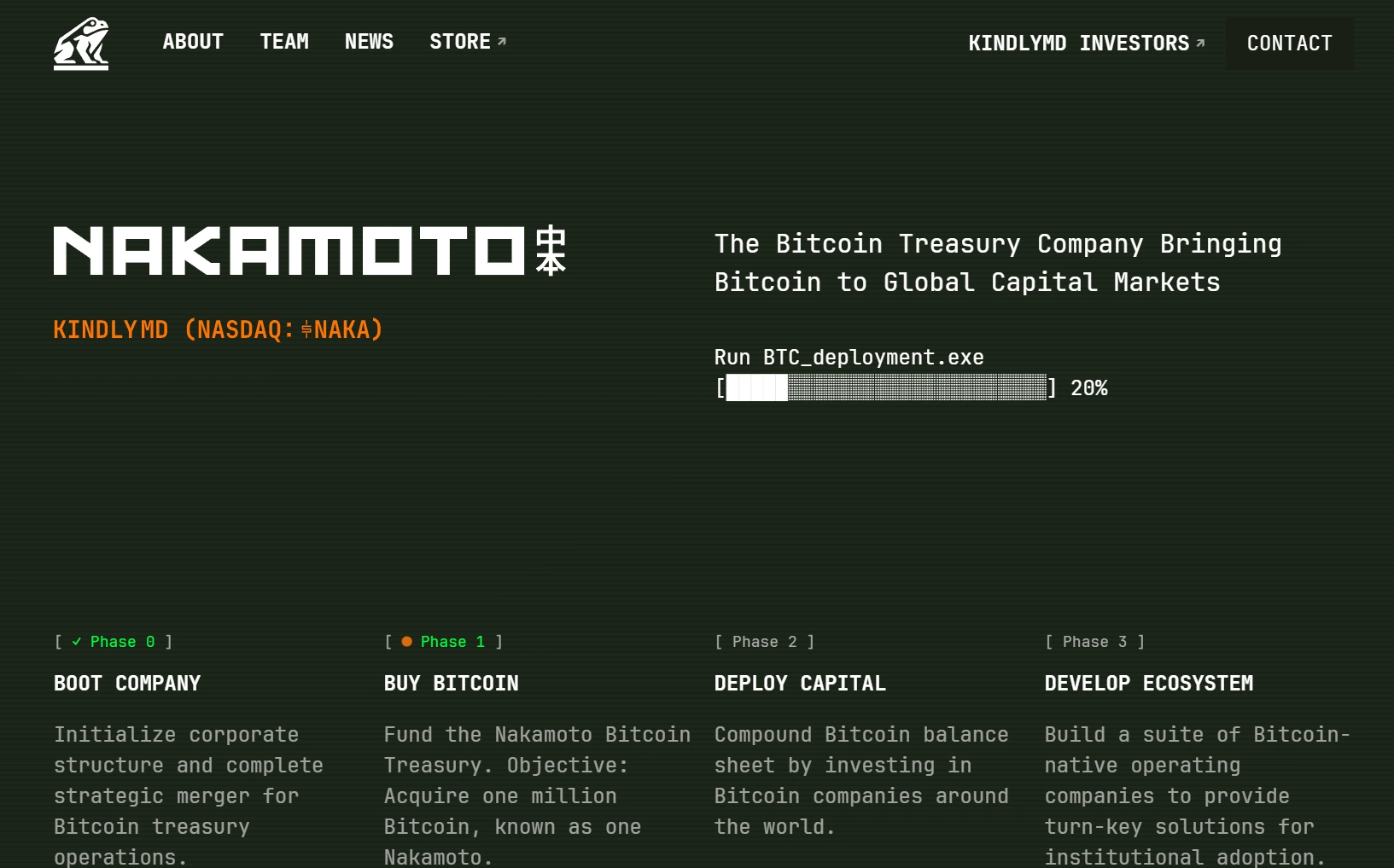
David Bailey’s Bitcoin Treasury comes to life
On August 14, 2025, KindlyMD, Inc. (NASDAQ: NAKA) finalized its merger with Nakamoto Holdings Inc., a Bitcoin-native holding company, marking a bold step toward establishing a publicly traded Bitcoin treasury vehicle. The combined entity, retaining the KindlyMD name, will trade on the Nasdaq Capital Market under the ticker “NAKA,” with Nakamoto operating as a wholly-owned subsidiary focused on Bitcoin financial services. The merger, backed by $540 million in private placement (PIPE) financing and an anticipated $200 million convertible note offering, aims to fund significant Bitcoin acquisitions and drive global adoption.
David Bailey, Nakamoto’s founder and the combined company’s CEO, envisions a future where Bitcoin anchors global capital markets. “Since my journey in Bitcoin began 13 years ago, I’ve believed it will become the most valuable asset in history,” Bailey stated. The company’s ambitious goal is to acquire one million Bitcoin, leveraging innovative financial strategies to integrate the cryptocurrency into corporate and government treasuries.Bailey revealed his plan in a post on X (formerly Twitter) on Monday, writing:
$762M Allocation to Acquire 6,400 BTC
The $762.5 million allocation, rounded up in Bailey’s statement, will be used to acquire roughly 6,400 BTC at current market prices of about $118,892 per coin. The purchase will be executed using a Volume Weighted Average Price (VWAP) strategy to minimize slippage and avoid market disruption, rather than a straight market buy.
Building a $1B Bitcoin Treasury
This move is part of Bailey’s broader $1 billion Bitcoin accumulation goal, allowing Nakamoto to join the ranks of major corporate holders like MicroStrategy and Metaplanet. Following its merger with Nasdaq-listed KindlyMD earlier this year, Nakamoto has gained access to significant capital resources, having previously secured $710 million to fuel its Bitcoin treasury expansion.
Expanding Influence in the Bitcoin Space
Bailey, who also co-founded Bitcoin Magazine’s parent company BTC Inc., has described his vision as building a “Bitcoin juggernaut” that will become one of the largest holders in the world. He also took to X recently to signal his plans to raise up to $200 million for a political action committee to advance Bitcoin’s interests in the United States.
Corporate Bitcoin Holdings Continue to Rise
Nakamoto’s purchase comes amid a surge in corporate Bitcoin acquisitions, with over 1.24 million BTC now held by public and private companies worldwide, showing Bitcoin’s growing presence in institutional portfolios.
news
Coinbase DEX launches for the first time ever
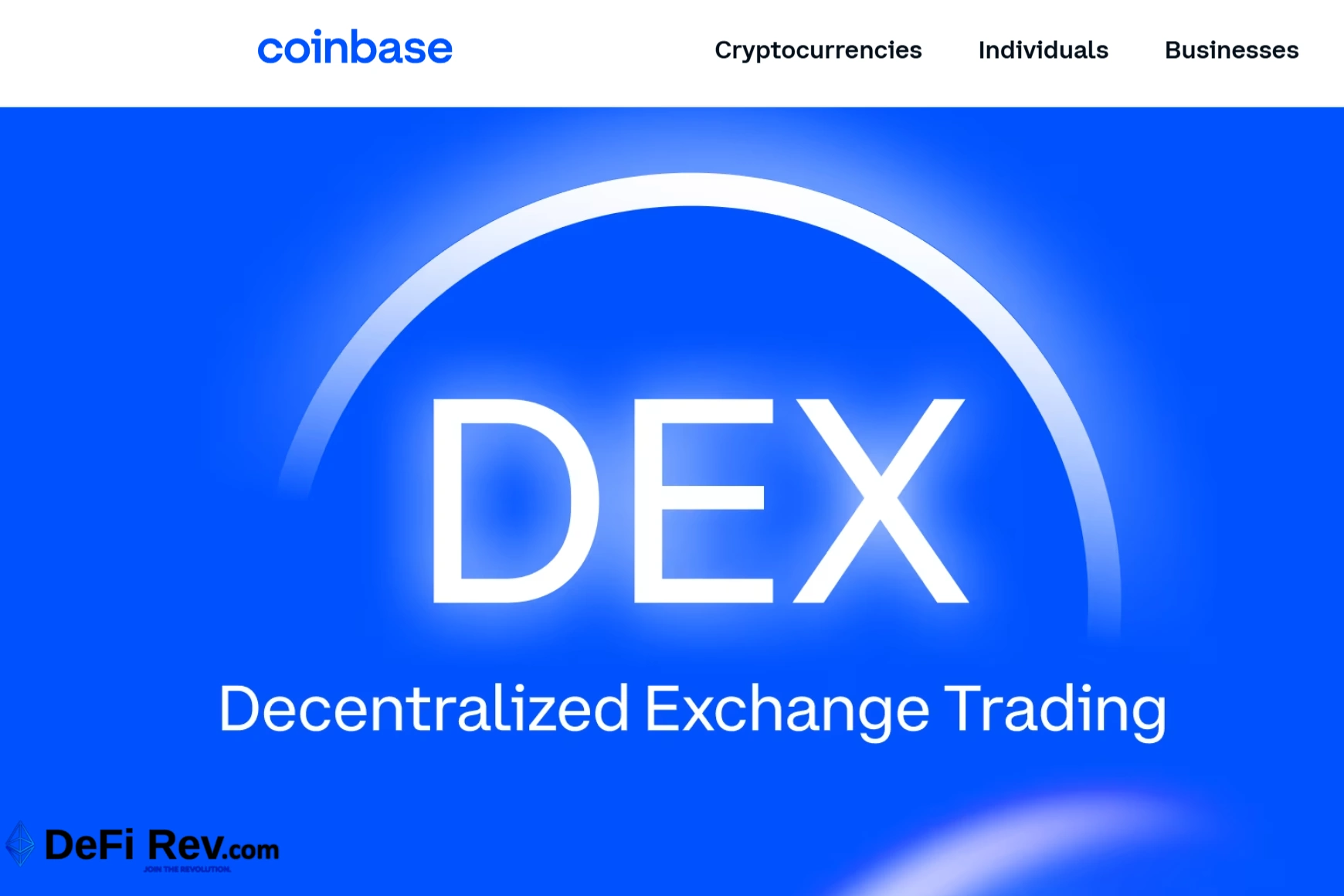
Coinbase DEX has rolled out decentralized exchange (DEX) trading directly inside its app, giving users access to millions of onchain assets without leaving the platform. The launch is live for U.S. users outside New York State and runs on Coinbase’s Ethereum Layer 2 network, Base.
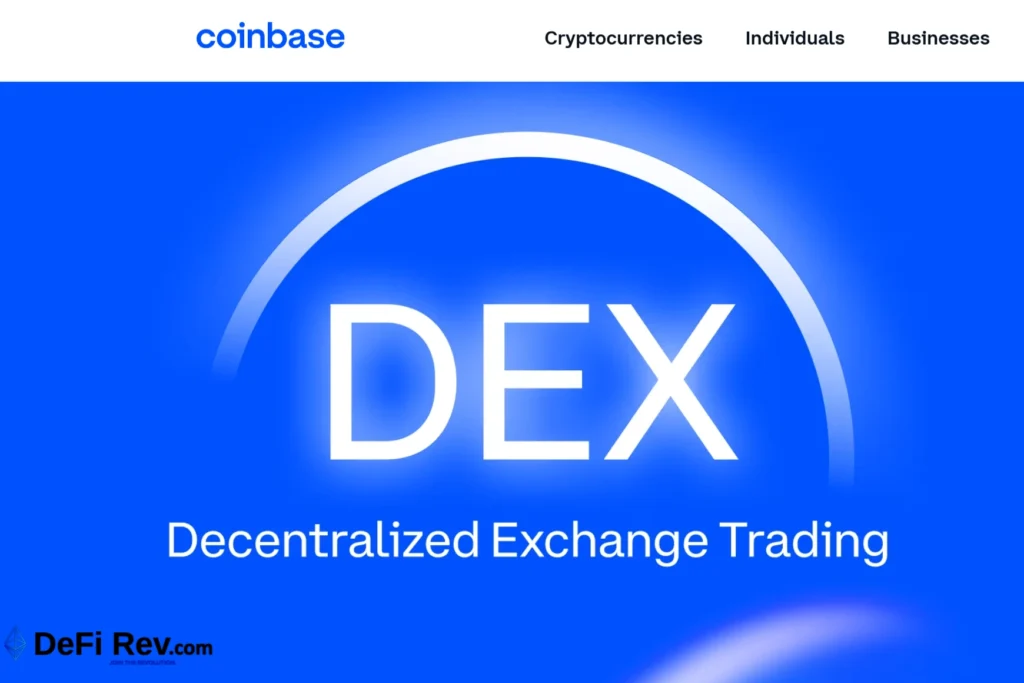
The feature introduces an integrated self-custody wallet, letting traders buy, sell, and manage tokens from the same interface they already use. Moreover, Coinbase is covering all network fees at launch, removing one of the main barriers to decentralized trading.
Faster Access to Onchain Markets
With the new Coinbase DEX integration, users can trade tokens within moments of their creation on Base. The initial rollout includes Base-native assets from projects like Virtuals AI Agents, Reserve Protocol DTFs, SoSo Value Indices, Auki Labs, and Super Champs. Support for new assets will be added in batches to maintain stable performance.
Trades are routed through Coinbase DEX aggregators that scan platforms like Aerodrome and Uniswap to secure the best available prices. Market data and risk insights are pulled directly from onchain sources, with Coinbase blocking access to tokens flagged as malicious by third-party security partners.
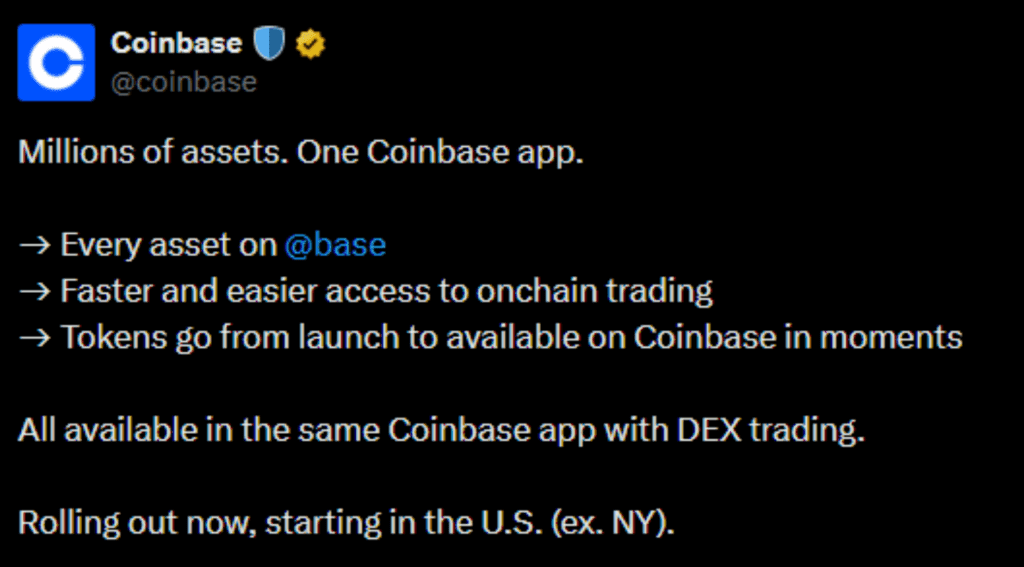
“A new era of access, going from just 300 assets yesterday to millions before long.” -Coinbase
Expansion Beyond Base
Coinbase plans to expand DEX trading to more networks, starting with Solana, and eventually to more countries. This move combines centralized convenience with decentralized freedom, offering portfolio management, fiat integration, and instant access to emerging tokens.
The company is positioning the update as part of its “everything exchange” vision, aiming to merge traditional listings with rapid onchain access. For traders and builders, this could mean faster entry to markets and a larger audience from day one.
news
Circle to Launch ARC Layer 1
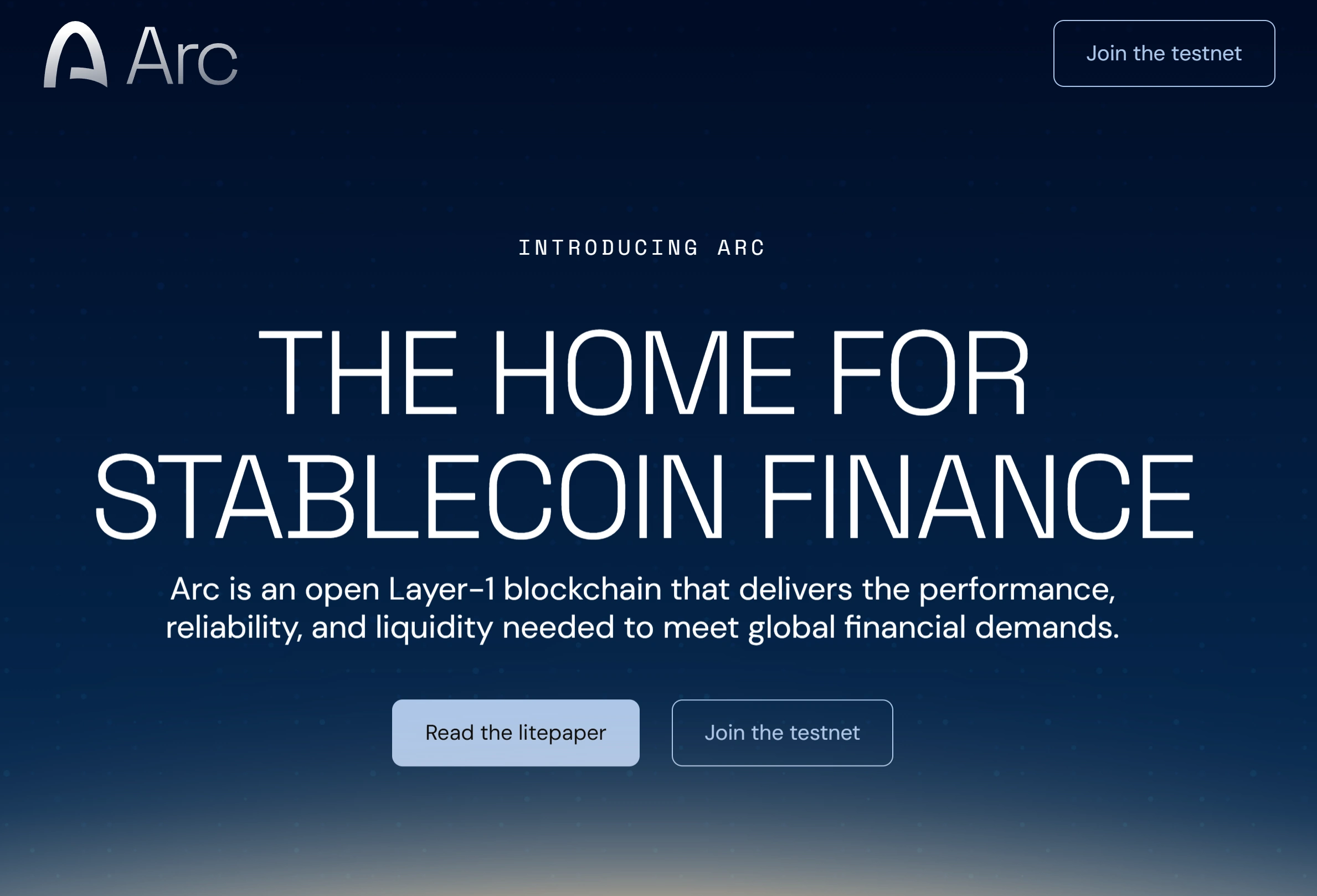
USDC issuer Circle has announced plans to launch its own open Layer-1 blockchain, Arc, later this year. The network is designed specifically for stablecoin payments, foreign exchange, and capital markets, a move the company calls “the next era of stablecoin-native applications.” The announcement was made on August 12 through Circle’s official blog and X post:
Arc will be EVM-compatible and use USDC as its native gas token. This allows users to pay predictable, dollar-denominated transaction fees without holding volatile crypto assets. Other features include a built-in FX engine, deterministic sub-second settlement finality, and opt-in privacy controls.
Circle says Arc will be fully integrated across its platform and remain interoperable with the 24 blockchains already supporting USDC. The blockchain will run on Malachite, a high-performance consensus engine acquired from Informal Systems, and its core software will be released under an open-source license.
Based on their announcement, use cases for Arc range from cross-border payments and stablecoin FX markets to tokenized assets and on-chain credit systems. Circle aims to give developers and institutions a unified foundation to build stablecoin-powered applications at scale.
Arc will enter private testnet in the coming weeks, with a public testnet expected this fall and mainnet beta in 2026. As Circle put it, Arc is intended to be “the home for all forms of digital money and tokenized value,” bridging enterprise needs with the openness of public blockchain infrastructure.
-

 trading2 years ago
trading2 years agoBittensor booms as Chip Mania hits Stock Market: The AI Race and the Potential of TAO
-

 news2 years ago
news2 years agoPayPal Crypto Bound! PayPal is betting on bitcoin and DeFi in a BIG way.
-

 trading2 years ago
trading2 years agoInjective Protocol, the new Binance IEO, packs a punch
-

 trading2 years ago
trading2 years agoUniSwap Heating up BIG TIME! Is this the end of IEOs? New DeFi Projects fundraising on Uniswap.
-

 trading5 years ago
trading5 years agoWhat is Solana? How SOL is aiming to solve scaling issues.
-

 interviews2 years ago
interviews2 years agoBobby Ong CoinGecko CEO: Interview with the Trailblazing Entrepreneur
-

 trading2 years ago
trading2 years agoAAVE CRYPTO ASSET SOARING
-

 trading2 years ago
trading2 years agoEthereum 2.0 Launch: Staking, Launch Date, and More. Here’s everything you need to know.

